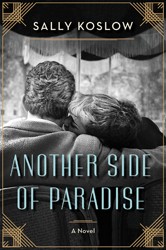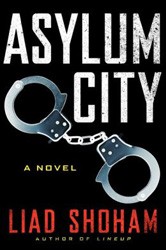Caleb, a remarkable dog, is born in Germany in 1935. He lives with his loving Jewish family until the Nazis forbid them to have a dog. A Nazi family adopts him and gives him to the SS, where he is trained to be a guard dog at a concentration camp. Caleb performs his duties admirably while acting as a keen observer of history and human nature. He sees the cruelty of the Nazis and the suffering that it caused, but he also witnesses the courage, loyalty, and friendship of the prisoners and those who aided them. He never forgets his original family.
This unique protagonist, who sees the world from twenty inches above the ground, has a keen sense of humor and irony as he wonders what, if anything, distinguishes people from dogs. This slim book offers a very unusual perspective on the Holocaust. While the atmosphere is bleak, it is not without hope. Book clubs will have very interesting discussions after reading Caleb’s story, and young adults, in particular, will relate to the human/dog bond. Anyone who enjoys a good story will love The Jewish Dog.
Also reviewed by Chava Pinchuk for Young Readers:
A puppy is born, and “the white one with the black circle around his eye and brown patch on his chest” charms his way into the hearts of Gottlieb family and becomes Caleb, who plays with the kids, takes walks and plays with other dogs, and enjoys the table scraps from the Sabbath and the Passover Seder. Soon the Nazis take power. The Nuremberg laws are passed, and the Gottliebs are no longer allowed to own a dog. Kalman Gottlieb gives him to a former colleague, the colleague is arrested and the dog is passed to the arresting Nazi officer. The officer is killed in the line of duty, and Caleb runs away and joins a pack of dogs. Picked up as a stray, Caleb is trained to be a guard dog and shipped to Treblinka, where his dog sense reunites him to Joshua Gottlieb. Joshua manages to get a job taking care of the dogs. They escape during the prisoner revolt (August 1943) and join the partisans in the forest. After the war they move to Israel. Dog and owner both die in their sleep on the same night.
Originally published in Hebrew as HaKelev HaYehudi (Yedioth Anronoth, 2007), this dog’s eye view of the Jewish experience before, during and after the Holocaust is most effective when Caleb observes from a naïve perspective, similar to Morris Gleitzman’s Once (Henry Holt, 2010). The epilogue is a little hokey, with Joshua telling God that Caleb must remain with him for eternity, rather than go to “doggie heaven.” There are graphic details of the Holocaust and of several owners’ sex lives. The combination of a story of a boy and his dog, events in Jewish history and a strong sense of both place and character make this a very worthwhile read. It is highly recommended for readers aged 14 and up.
Related Content:





